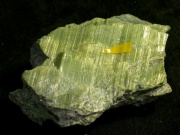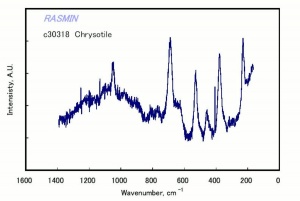Difference between revisions of "Chrysotile"
| (2 intermediate revisions by 2 users not shown) | |||
| Line 2: | Line 2: | ||
== Description == | == Description == | ||
| − | A fibrous mineral composed of hydrated magnesium silicate. Chrysotile is the most widely used type of [[asbestos]] fiber, accounting for about 95% of the world's usage most of which comes from Quebec. Chrysotile fibers are white and have a soft, silky texture. They have excellent flexibility and spinning properties. Chrysotile fibers are used to reinforce polymers and as heat resistant textiles. Because the inhalation of chrysotile fibers causes lung cancer, its use is regulated in the U.S. and banned in Australia and the European Union. | + | A fibrous [[serpentine]] mineral composed of hydrated magnesium silicate. Chrysotile is the most widely used type of [[asbestos]] fiber, accounting for about 95% of the world's usage most of which comes from Quebec. Chrysotile fibers are white and have a soft, silky texture. They have excellent flexibility and spinning properties. Chrysotile fibers are used to reinforce polymers and as heat resistant textiles. Because the inhalation of chrysotile fibers causes lung cancer, its use is regulated in the U.S. and banned in Australia and the European Union. |
| − | + | [[[SliderGallery rightalign|chrysotileRS.jpg~Raman (RASMIN)]]] | |
== Synonyms and Related Terms == | == Synonyms and Related Terms == | ||
asbestos; white asbestos; serpentine; hair of gold (Gr.); clinochrysotile (monoclinic form); orthochrysotile (orthorhombic form); parachrysotlie (orthorhombic form); chrysotiel (Ned.); crisótilo (Port.); Chrysotil (Deut.) | asbestos; white asbestos; serpentine; hair of gold (Gr.); clinochrysotile (monoclinic form); orthochrysotile (orthorhombic form); parachrysotlie (orthorhombic form); chrysotiel (Ned.); crisótilo (Port.); Chrysotil (Deut.) | ||
| − | + | == Risks == | |
| − | |||
| − | == | ||
| − | + | * Noncombustible. Unaffected by heat. | |
| + | * Carcinogenic. | ||
| + | * Highly toxic by inhalation of dust. | ||
| + | * Skin contact causes irritation. | ||
| + | * NIH: [https://pubchem.ncbi.nlm.nih.gov/compound/Chrysotile Information sheet] | ||
| − | + | ==Physical and Chemical Properties== | |
| − | Resistant to alkalis | + | * Fiber length = 12-300 mm (0.5 - 12 inches) |
| + | * Diameter = 300-350 angstroms | ||
| + | * Cross section is polygonal or circular | ||
| + | * Tensile strength = 80,000-200,00 psi | ||
| + | * Resistant to alkalis; Attacked by dilute acids | ||
| + | * Monoclinic, crystals rare, usually fibrous | ||
| + | * Cleavage = almost perfect | ||
| + | * Fracture = fibrous | ||
| + | * Luster = silky | ||
| + | * Streak = white | ||
| + | * Low birefringence; dispersion = weak | ||
{| class="wikitable" | {| class="wikitable" | ||
| Line 22: | Line 34: | ||
! scope="row"| Composition | ! scope="row"| Composition | ||
| Mg3Si2O5(OH)4 | | Mg3Si2O5(OH)4 | ||
| − | |||
| − | |||
| − | |||
|- | |- | ||
! scope="row"| Mohs Hardness | ! scope="row"| Mohs Hardness | ||
| Line 30: | Line 39: | ||
|- | |- | ||
! scope="row"| Density | ! scope="row"| Density | ||
| − | | 2.2 | + | | 2.2 - 2.5 g/ml |
|- | |- | ||
| − | ! scope="row"| | + | ! scope="row"| Refractive Index |
| − | | | + | | 1.569 - 1.570 |
|} | |} | ||
| − | == | + | ==Resources and Citations== |
| − | + | * Gem Identification Lab Manual, Gemological Institute of America, 2016. | |
| − | |||
| − | |||
| − | |||
| − | |||
| − | |||
| − | |||
| − | |||
| − | |||
| − | |||
| − | |||
* G.S.Brady, ''Materials Handbook'', McGraw-Hill Book Co., New York, 1971 Comment: p. 70 | * G.S.Brady, ''Materials Handbook'', McGraw-Hill Book Co., New York, 1971 Comment: p. 70 | ||
| − | |||
* ''Identification of Textile Materials'', The Textile Institute, Manchester, England, 1985 | * ''Identification of Textile Materials'', The Textile Institute, Manchester, England, 1985 | ||
| − | + | * ''Encyclopedia Britannica'', http://www.britannica.com Comment: "chrysotile." Accessed 7 Sept. 2005 . | |
| − | * ''Encyclopedia Britannica'', http://www.britannica.com Comment: "chrysotile." | + | * Wikipedia: [https://en.wikipedia.org/wiki/Chrysotile Chrysotile] (Accessed Sept. 7, 2005 and Dec 2022) |
| − | |||
| − | * Wikipedia | ||
| − | |||
* ''The American Heritage Dictionary'' or ''Encarta'', via Microsoft Bookshelf 98, Microsoft Corp., 1998 | * ''The American Heritage Dictionary'' or ''Encarta'', via Microsoft Bookshelf 98, Microsoft Corp., 1998 | ||
Latest revision as of 12:27, 5 January 2023
Description
A fibrous Serpentine mineral composed of hydrated magnesium silicate. Chrysotile is the most widely used type of Asbestos fiber, accounting for about 95% of the world's usage most of which comes from Quebec. Chrysotile fibers are white and have a soft, silky texture. They have excellent flexibility and spinning properties. Chrysotile fibers are used to reinforce polymers and as heat resistant textiles. Because the inhalation of chrysotile fibers causes lung cancer, its use is regulated in the U.S. and banned in Australia and the European Union.
Synonyms and Related Terms
asbestos; white asbestos; serpentine; hair of gold (Gr.); clinochrysotile (monoclinic form); orthochrysotile (orthorhombic form); parachrysotlie (orthorhombic form); chrysotiel (Ned.); crisótilo (Port.); Chrysotil (Deut.)
Risks
- Noncombustible. Unaffected by heat.
- Carcinogenic.
- Highly toxic by inhalation of dust.
- Skin contact causes irritation.
- NIH: Information sheet
Physical and Chemical Properties
- Fiber length = 12-300 mm (0.5 - 12 inches)
- Diameter = 300-350 angstroms
- Cross section is polygonal or circular
- Tensile strength = 80,000-200,00 psi
- Resistant to alkalis; Attacked by dilute acids
- Monoclinic, crystals rare, usually fibrous
- Cleavage = almost perfect
- Fracture = fibrous
- Luster = silky
- Streak = white
- Low birefringence; dispersion = weak
| Composition | Mg3Si2O5(OH)4 |
|---|---|
| Mohs Hardness | 2.5-3.0 |
| Density | 2.2 - 2.5 g/ml |
| Refractive Index | 1.569 - 1.570 |
Resources and Citations
- Gem Identification Lab Manual, Gemological Institute of America, 2016.
- G.S.Brady, Materials Handbook, McGraw-Hill Book Co., New York, 1971 Comment: p. 70
- Identification of Textile Materials, The Textile Institute, Manchester, England, 1985
- Encyclopedia Britannica, http://www.britannica.com Comment: "chrysotile." Accessed 7 Sept. 2005 .
- Wikipedia: Chrysotile (Accessed Sept. 7, 2005 and Dec 2022)
- The American Heritage Dictionary or Encarta, via Microsoft Bookshelf 98, Microsoft Corp., 1998

